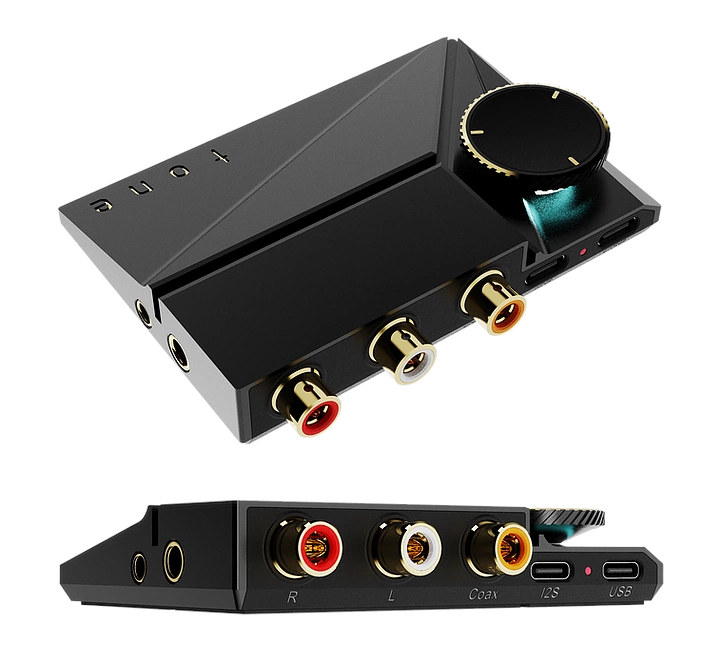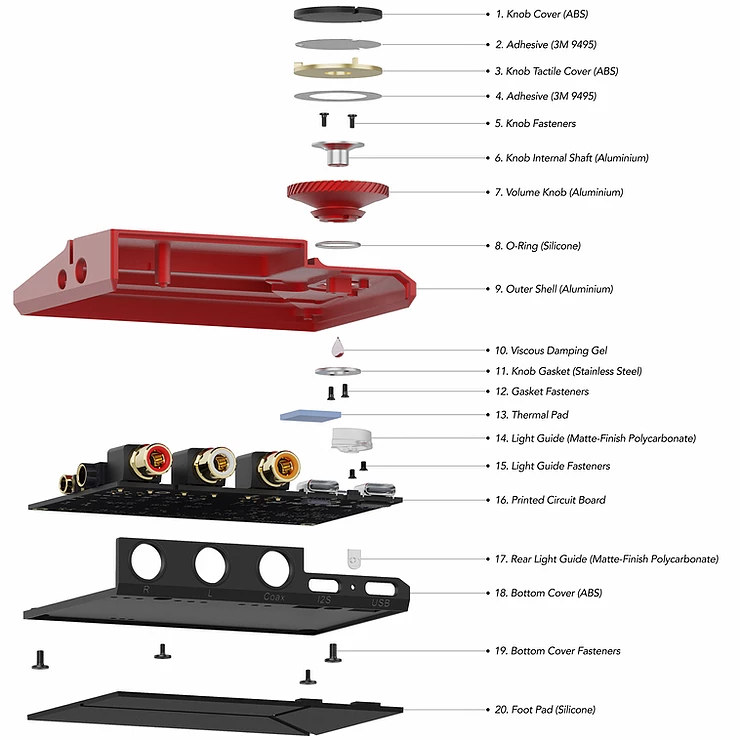Khadas Tone high-resolution audio board was introduced in 2018 for audiophiles wanting to design their own DIY HiFi system using Khadas VIM/VIM2 SBC, or connect it the USB version of the board to other single board computers.
The company is now about to launch Khadas Tone 2 Pro mini desktop Hi-Fi system based on the same ESS ES9038Q2M DAC, but a faster XMOS XU216 capable of handling MQA decoding, and equipped with balanced RCA outputs, as well as an I2S USB-C port.
Khadas Tone 2 Pro key features and specifications:
- Multicore MCU – XMOS XU216 with 16 real-time logical cores on 2x xCORE tiles; up to 1000 MIPS
- DAC – ES9038Q2M 32-bit stereo mobile audio DAC
- Amplifiers – 4x OPA1612 operational amplifiers, 3x buffer amplifiers
- Seamless hardware MQA decoding
- Native DSD512 decoding, PCM decoding up to 32Bit/384kHz.
- Left and right balanced RCA jacks for transmitting a balanced analog signal via Line-out.
- 3.5mm single-ended and 4.4mm balanced headphone jacks
- Rotate-push encoder for mode-selection and volume control
- RGB volume ring light
- USB – 2x USB-C ports, one for power and the other for separate I2S signal input
If it looks like a finished consumer product instead of a DIY solution, that’s because it is. One of the reasons is that MQA (the company) will not allow MQA Audio (Master Quality Authenticated) technology to be used in bare/development boards. Khadas explains what makes Tone 2 Pro special as follows:
Tone2 Pro is our second generation Tone Board from Khadas that incorporates a variety of user feedback from our first-gen product, the Tone1. ESS ES9038Q2M DAC has been paired with four powerful OPA1612 operational amplifiers, and three buffer amplifiers. This 3-stage amplification pathway enables Tone2 Pro to drive a wide-range of demanding audiophile-grade headphones with impedances of up to 150 ohms. The OPA1612 was selected because it provides superior audio quality and excellent distortion characteristics; THD + noise is below 0.00008% throughout the audio range (20Hz to 20kHz).
…
The latest addition to file format support is MQA decoding. The onboard XMOS XU216 processor enables bit-perfect, hardware-native, USB class II, asynchronous “unfolding” of MQA data for both web streaming and local high fidelity audio playback, enabling future-proof “original master quality” audio reproduction just as the artist intended, but at reasonable file sizes and streaming bandwidth requirements.
Khadas also plans to offer Tone 2 DIY Kit in the future, but it will lack MQA support, the headphone amp and features the same XMOS XU206 as found in the original Tone board.
Khadas Tone 2 Pro will be launched on December 16th for $179.99 on Hifigo. But you can pre-register to get the HiFi audio system for $169.99, or try your luck to win one as part of a giveway

Jean-Luc started CNX Software in 2010 as a part-time endeavor, before quitting his job as a software engineering manager, and starting to write daily news, and reviews full time later in 2011.
Support CNX Software! Donate via cryptocurrencies, become a Patron on Patreon, or purchase goods on Amazon or Aliexpress. We also use affiliate links in articles to earn commissions if you make a purchase after clicking on those links.






Impressive specs, it looks like it was done with a great taste. I never heard about MQA before and still don’t know how/where it’s supposed to be used.
Finally, an elegant enclosure for an excellent dac!
I’m a musician and music fanatic. But I don’t know/understand what makes this better.
The term audiophile always seemed to be “someone who’s got way too much money to spend on music equipement but most of the times knows nothing of music”.
I might have damaged my hearing too much giving concerts and rehearsing to hear the difference.
I like good sound. But I’ve got that with +30 years old speakers and a sub woofer. Just using onboard sound or hdmi sound.
I’ll have to keep wondering if this improves anything since I can’t afford it at all. I wonder what component makes this so expensive. Probably just the MQA licence.
Good that Khadas can have their piece of the cake.
I overall agree with your points. For me it’s about the same, and if I want very good sound I use a good headphone. However what really matters to me is to have no audible static noise at the max level I expect to use. And this is rarely achievable when you start to embed high-frequency integrated circuits into the same enclosure as the preamp/amp. But if they can succeed in the consumer market with a good product, it’s great, and I wish them good luck.
RCA is not balanced.
I already seen some proprietary “RCA like” balanced connectors but I really hate such kind of things. Why not use a couple of reliable standard XLR?
This finally look like a high spec board designed like a toy…
I think that the reason simply is that the RCA’s “ground” is isolated from the ground so that it will not produce alternating current when a little current may flow between the USB port and the amplifier, nor will they artificially short the two inputs from the amplifier. It’s not uncommon to make sure that an amplifier’s input is only attached to its own ground which is separate from all other components, this avoids radiated noise.
Unbalanced RCA has 2 pins while Balanced RCA has 3 pins. You can buy connectors on ebay for $30 a pair to make cable convert to standard XLR.
https://www.khadas.com/post/introducing-the-balanced-rca-jack
So they designed their own balanced RCA connector with 3-pins and patented it. They also offer a balanced RCA to XLR-3 cable.
It’s a new design by other company which it’s not from Khadas. They want to use this new technology to save the space and combine both RCA and XLR to 1 connector. However, they put more cost on themselves and users on new connectors type. Actually, it would add more cost to XLR users where they need to buy adapter. With around $30-$45 additional cost, XLR users can go for another DAC with standard design.
It’s Khadas team defined & designed the balanced RCA.
The company name showed on the patent documents is our parent company 🙂
Maybe in the next couple years, other companies start using this connector, then price would be reasonable. Other users may think what the convenient way for them beside the cost.
Bullshit. I prefer expensive, but with XLR outputs, Ess 9038 pro, or AKM 4499.
Yeah, “balanced RCA outputs”. There’s no such thing as a “balanced” RCA connector. By definition an RCA connector only has two conductors in a coaxial configuration. Putting a balanced output on a RCA connector immediately defeats the purpose of having a balanced output in the first place, which is lower noise! Industry standard for a SINGLE channel balanced connection uses an XLR or Quarter-Inch TRS (Tip-Ring-Shield) connector. A single balanced channel uses a three conductor Shielded-Twisted-Pair (STP) cable. For stereo, two STP cables and five termination connections are required, four for the two balanced channels and a common ground. Then there’s the “3.5mm single-ended and 4.4mm balanced headphone jacks”. Such things do not exist, at least not for truly balanced stereo outputs. You could have a 3.5mm or 4.4mm jack for a single channel, but the jack must be a TRS type and two separate jacks would be required, one for each channel. And where does the 4.4mm jack size come from? Industry standard is 3.5mm and 6.4mm (1/4″).
Please read their article before saying “such a thing does not exist” because they just created it. This is why it’s usually not wise to say “does not exist”, it tends to imply you know everything that exists, which is obviously mistaken (or pretentious).